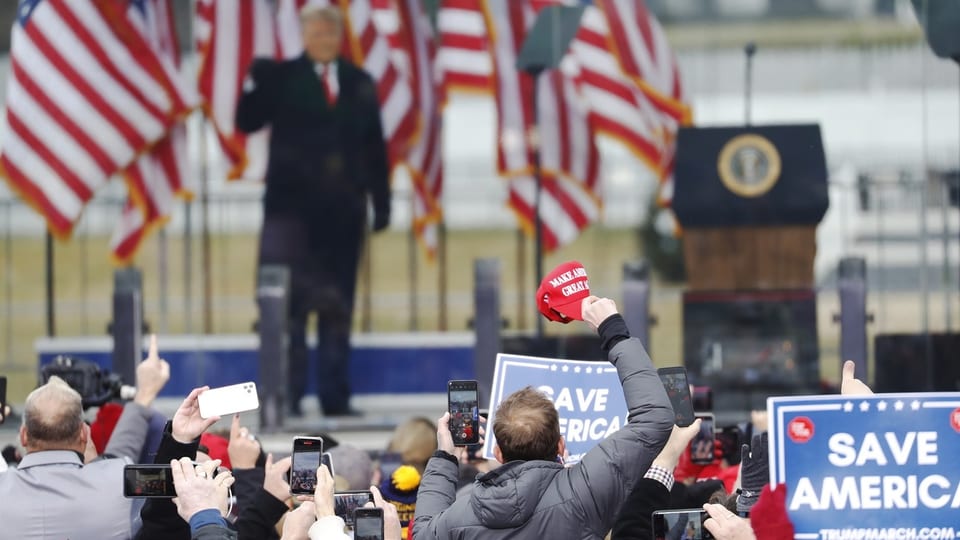Contents
Donald Trump uses disturbing rhetoric in front of his supporters. It’s not just words, warns a US researcher.
Donald Trump has never been known for his moderate rhetoric. Recently, the former US President has been turning the escalation screw a lot. During a campaign appearance in New Hampshire in mid-November, he fired against his political opponents: “We promise that we will eradicate the communists, Marxists, fascists and the radical left-wing crooks who live like vermin in our country.”
Legend:
In the USA, the primary elections will take place from mid-January. The parties determine who runs for president. It is becoming apparent that Joe Biden and Donald Trump will compete against each other again.
Getty Images/Sue Gerrits
A month later, Trump took aim at migrants at his next appearance in the state on the east coast of the USA: “They are poisoning the blood of our country, they are poisoning prisons and psychiatric hospitals all over the world, not just in South America.” The statements caused a storm of cheers among his supporters, but Trump received widespread criticism. Some commentators accused him of reaching into the mothballs of history:
Rhetorically, Trump is already preparing the ground for a presidential election campaign that is likely to further divide American society. The Biden campaign, for its part, fires back sharply: It also repeatedly compared Trump to Hitler:
The Biden side appears to be aiming to brand Trump as a threat to democracy. The Biden campaign’s communications director told the US newspaper Politico: “The rhetoric of Hitler and Mussolini resonates in Trump. We’re going to make sure people understand how dangerous this is.”
But what does the now 77-year-old real estate mogul achieve with his appearances? One person who can assess this is Jennifer Mercieca, who teaches communications at Texas A&M University. She has been examining Trump’s political rhetoric since 2015 and has written a book about it.
The enemy within
Mercieca sees Trump’s words as an intensification of his well-known strategy of “us against them.” During his speech before the storming of the Capitol on January 6, 2021, Trump asked his supporters 20 times to “fight like hell”: “But the message was only contained once in his manuscript. We should definitely take Trump’s words seriously. Many people want to downplay what he says. But Trump chooses his words very carefully.”

Legend:
The rhetoric scientist recognizes two basic features in Trump’s speeches: generating outrage and thus headlines – and at the same time distracting from one’s own guilt. “And he is very successful with that,” concludes Mercieca. Image: Trump during his speech before the storming of the Capitol.
Keystone/EPA/Michael Reynolds
Even in US history, presidents have sometimes chosen dehumanizing and violent rhetoric, Mercieca continues. However, this was directed against an external enemy and was intended to mobilize the population in the event of war. “Trump, on the other hand, uses this language internally. He describes the political opposition as enemies of the nation. It is highly unusual for a US president to refer to his own compatriots in this way.”
The opposition is evil – it is not just people with different views.
The rhetoric falls on fertile ground among his followers. But Trump did not create this alone. For decades, US populists have been spreading the view that politics is war and that the enemy is cheating. “His followers therefore expected that a strong leader would one day appear who would speak and act autocratically.”
This high-handed action is now also manifesting itself in day-to-day political business. Because if politics means war, cooperation with the political opponent is impossible.

Legend:
Mercieca gives the example of border protection: “One party talks about a humanitarian crisis and wants to help with tents, blankets and food. The other party is talking about an invasion and wants the army at the border to stop refugees. These two perspectives are incompatible.”
Getty Images/John Moore
«The opposition is evil – they are not just people with different views. “You don’t look for solutions with them or make compromises,” concludes the researcher.
